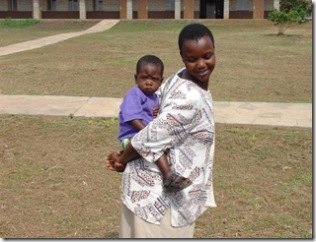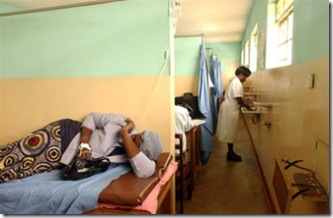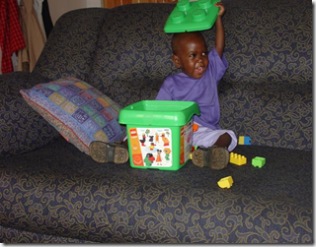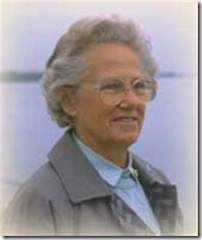 Â Helen Roseveare had just graduated from medical school when she moved to the Belgian Congo to serve as a doctor to local tribes. She built a hospital made of handcrafted bricks, stocked it with medicines, and for 12 years treated malnutrition, nursed lepers, delivered babies, and performed amputations.
 Helen Roseveare had just graduated from medical school when she moved to the Belgian Congo to serve as a doctor to local tribes. She built a hospital made of handcrafted bricks, stocked it with medicines, and for 12 years treated malnutrition, nursed lepers, delivered babies, and performed amputations.
Her work there was tragically interrupted with the onset of a bloody revolution. On August 8, 1964, the Republic of Congo was plunged into a civil war. That day marked the beginning of five terrible months of savage brutality during which 27 missionaries were killed, more than 200 Roman Catholic priests and nuns were murdered, and nearly a quarter of a million innocent African civilians were butchered.
Roseveare was rescued from the carnage, along with many others. She returned temporarily to her home in England to heal from her anguish and to share her story.
But when this woman known by the nationals affectionately as “Mama Luka” spoke of her experiences in the Congo, a provocative question repeatedly surfaced: “Why did God let you suffer?”
The reality of a missionary, who laid out her life to serve God only to be rewarded with cruelty and suffering, seemed incongruous. Routinely people in search of answers unburdened their hearts to Roseveare: a young mother whose baby drowned, a girl who was raped — people who lived in angst, unable to connect the dissonance of life’s experiences to the God of the Bible. Her answer became simply to share with them how God had given her faith and strength to overcome her own heart-wrenching trials.
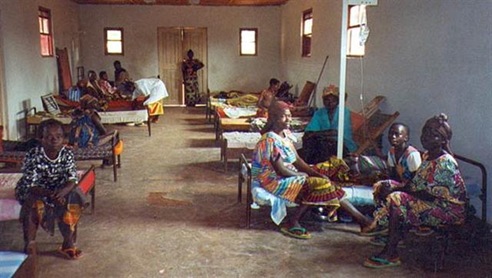 Invited to address the question of suffering with a small gathering one night she first quoted Isaiah 49:2, “He made my mouth like a sharp sword; in the shadow of His hand He hid me; He made me a polished arrow;“ She reached backward toward the mantel and eased a long-stemmed rose bud from a tall vase. As she spoke, she broke off the thorns, the leaves, the petals, the green outer layer of stem – every element that makes a rose and rose. All that was left was a lithe, straight shaft. The pieces that lay on the floor were not bad things. But, she explained, they had to be removed if she were going to make an arrow. God does this to us, she said. He removes everything – even innocent, good things – that hinders us from being the arrows. He strips and sands and polishes so that he can shoot the arrow for his purposes at his intended target.”
Invited to address the question of suffering with a small gathering one night she first quoted Isaiah 49:2, “He made my mouth like a sharp sword; in the shadow of His hand He hid me; He made me a polished arrow;“ She reached backward toward the mantel and eased a long-stemmed rose bud from a tall vase. As she spoke, she broke off the thorns, the leaves, the petals, the green outer layer of stem – every element that makes a rose and rose. All that was left was a lithe, straight shaft. The pieces that lay on the floor were not bad things. But, she explained, they had to be removed if she were going to make an arrow. God does this to us, she said. He removes everything – even innocent, good things – that hinders us from being the arrows. He strips and sands and polishes so that he can shoot the arrow for his purposes at his intended target.”
Independence was declared in the Belgian Congo on June 30, 1960. Mutiny broke out in the army, the white population fled, and interracial relations crumbled. “It nearly broke my heart,” says Roseveare. “It wasn’t only in the upper echelons of government, it wasn’t even just in local government, it was in the church.” A colleague once told her, “Well doctor, we don’t blame you for being white. In fact, we’re really rather sorry for you being white. But at the end of the day you are white.” Her beloved friends no longer trusted her. She prayed and fasted fervently, seeking God’s face for reconciliation.
Then came the rebellion and a terrible night that transformed her faith.
“It was a Saturday afternoon,” recalls Roseveare. “A truck drove into the village where I lived, and I could hear the noise from house of rough, angry voices shouting. And then two men burst into my home. That was the first indication I had that we were at war. “[The men] inspected everything and smashed a lot of my property, and then I suddenly realized that they were intent on evil. I tried to run away and hide, and they came with powerful torches, and they found me. They struck me, they beat me. I lost my back teeth to the boot of a rebel soldier that night. They broke my glasses I can’t focus on anything if I haven’t got them on. That was most frightening. When you can see them, you can at least put an arm up to take the blow. When you can’t see, you’re so defenseless.” During the course of the evening, Roseveare was badly violated by her perpetrators. “I don’t think I was praying; I was numb with horror, dread, fear. If I had prayed, I think I would have prayed, “My God, my God, why has thou forsaken me?” I felt He’d left me. I didn’t doubt God. I never doubted God. But I felt, for that moment, that He’d left me to handle the situation by myself.
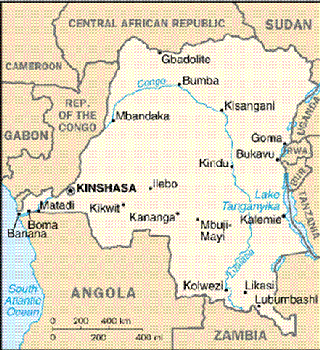 As these thoughts poured into her mind, Roseveare became aware of a holy presence near her. “I knew with every fiber in my being that God, the almighty Creator, was there,” she pronounces with quiet certainty, insisting that God never gives us evil, but takes what is intended for evil and makes it good.
As these thoughts poured into her mind, Roseveare became aware of a holy presence near her. “I knew with every fiber in my being that God, the almighty Creator, was there,” she pronounces with quiet certainty, insisting that God never gives us evil, but takes what is intended for evil and makes it good.
During the pinnacle of her suffering, God spoke to Roseveare in a way that He knew she would understand and accept. “I believe the words that God spoke to me, although I didn’t hear them as words, were,
“Can you thank Me for trusting you with this, even if I never tell you why?”
You know, that’s shattering. You and I think of us trusting Him. But the thought that He wants to trust us, that was something very new to my thinking.”
He gave her the strength to say yes and she prayed, “Yes, God. If somehow, somewhere this fits for purposes, I don’t know how, but yes, thank You, God, for trusting me with this.” God did not take away the wickedness, the cruelty, or the pain. It was still there. But He turned her fear into peace.
Roseveare and her fellow missionaries endured faithfully that long and dreadful weekend. The following Tuesday the rebels returned for her. She was taken away by herself in the middle of the night. As dawn broke, they came to a village. The rebel soldiers had gathered nearly 800 local men into the village square. They had been told they would attend a people’s court in which Roseveare would be tried for the things that had occurred the previous week. At the given signal they were instructed to shout, “She’s a liar! She’s a liar!” They would then be asked, “What will we do with her?” The mandated response was, “Modecco! Modecco!” which meant “Crucify her! Crucify her!” The defendant knew she would die, although she did not know how.
The trial scene began.
“They wanted me to go through in detail in front of these 800 men what had happened the previous Thursday,” Roseveare says, an audible quiver in her voice. “I wasn’t going to speak up in front of all those men. They struck me over the face with the butt end of a gun; I couldn’t stand the pain so I spoke up.”
The moment of judgement came.
Roseveare couldn’t see her jury; her eyes had nearly closed with the swellings of the beatings. But she could hear. “I heard a sound I had never heard before and will probably never hear again. I heard 800 strong farming men break down and cry.
They were weeping.”
Now, instead of seeing her as the hated white foreigner, they saw her as their doctor.
“They have a word in Kibudu, which means “blood of our blood, bone of our bone,” she says. “They rushed forward and said, “She’s ours. 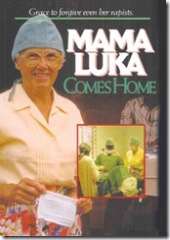 She’s ours.”
She’s ours.”
They took me into their arms and pushed the rebel soldiers out of the way.
“In that moment the black/white division disappeared,” she professes triumphantly.
“I can honestly say, right through till today, in that area there has never been a black/white division again. We’re all one in Christ Jesus.”
When she fervently sought the Lord so many years before, she had no idea that God would make her an instrument in bringing about racial harmony.
Why does a God of love allow suffering?
For Roseveare that question is, in itself, a contradiction. Love and suffering are inextricably linked.
“If you didn’t love, you wouldn’t hurt,” she explains, pointing to her exemplar as evidence.
God loves us so much that He gave His own son to the Cross. Because He loves, He suffered, giving us an example to follow in His steps. (1 Peter 2:21)”
In the years following the brutality that she suffered she recounted other thoughts that were in her mind as she was insulted, cursed and abused. “Suddenly Christ had been there. No vision, no voice, but His very real presence. A phrase came into my mind, “led as a lamb to the slaughter”, one outstanding fact seemed to dominate: For my sake, He went as a willing sacrifice. Then, as swiftly, He spoke into my heart: “They’re not fighting you: these blows, all this wickedness, is against Me. All I ask of you is the loan of your body. Will you share with Me one hour in My sufferings for these who need My love through you?”
She looked back later on this whole period and wrote: ‘We learned why God has given us His name as I AM (Exodus 3:14). His grace always proved itself sufficient in the moment of need, but never before the necessary time.
“He Gave Us a Valley”, Helen Roseveare, p.36,
“Arrrows in the Hands of God”, Challis.com, June 15, 2005
“Can you thank me?” an interview with Helen Roseveare, Tonya Stoneman
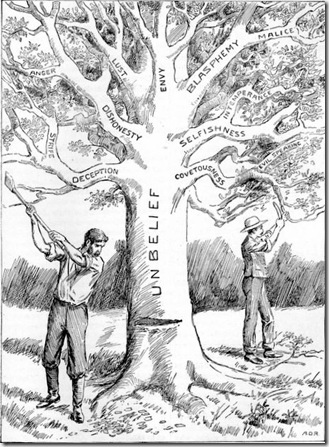 Today, I started a personal study of the Book of Hebrews.
Today, I started a personal study of the Book of Hebrews.



